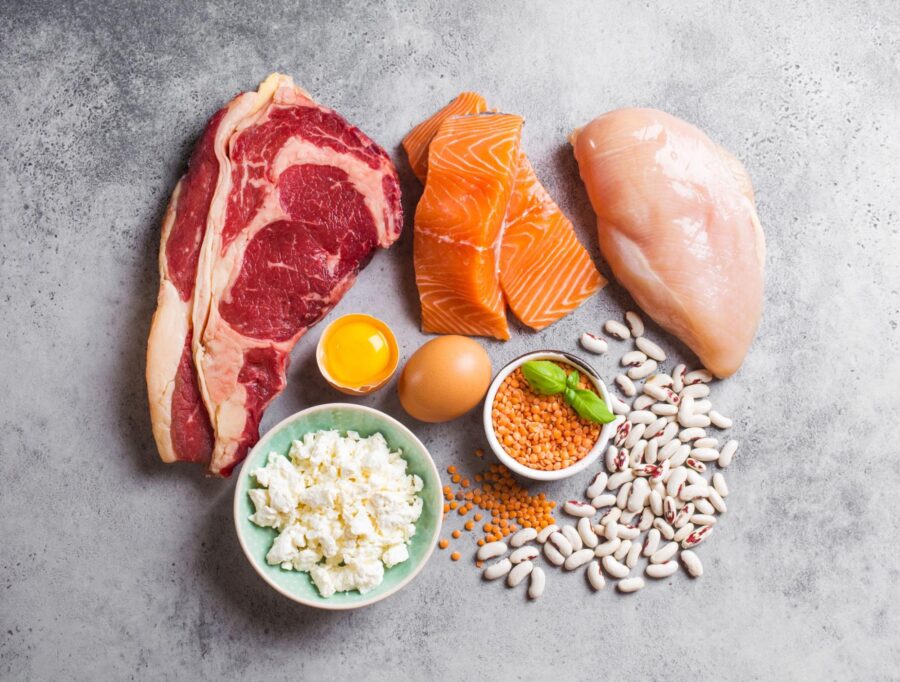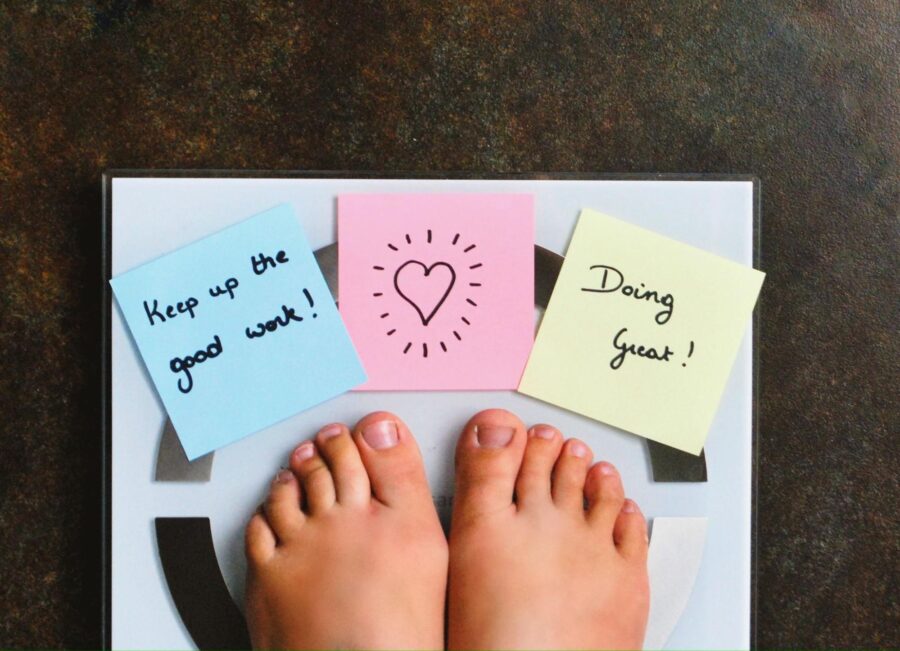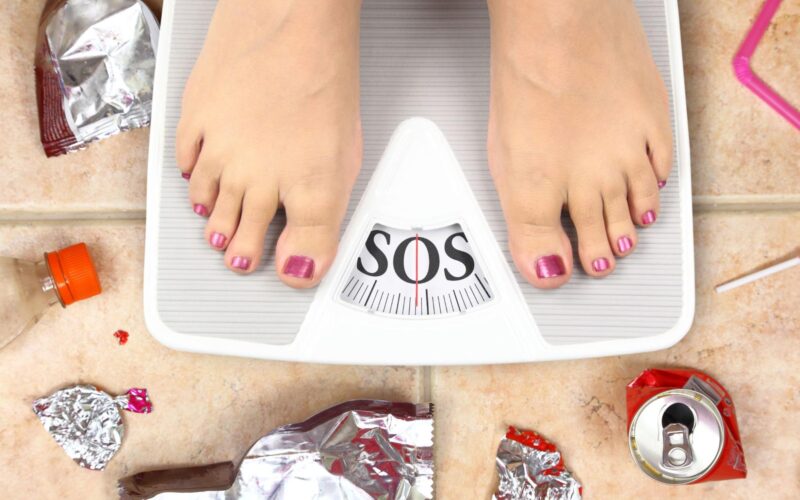Weight loss can feel like a constant battle. Let’s break down the most common pitfalls and create a plan for lasting success.
1. Setting Unrealistic Goals

Envato
The allure of quick fixes is tempting, but drastic goals often lead to disappointment and can set you up for failure. This can sabotage your motivation and potentially even encourage unhealthy patterns.
What to do instead:
- Focus on sustainable change: Healthy weight loss occurs at a rate of 1-2 pounds per week. While it might feel gradual, this approach is the key to keeping the weight off long-term.
- Set SMART goals: Your goals should be Specific, Measurable, Achievable, Relevant, and Time-bound. Instead of “I want to lose weight,” try “I will lose 10 pounds in 2 months by eating healthfully, exercising 3 times a week, and tracking my progress.”
- Celebrate small wins: Acknowledge milestones along the way to stay motivated.
2. Skipping Meals

Envato
Intuitively, skipping meals might seem like a way to reduce intake, but it has the opposite effect. This habit slows your metabolism, making your body store fat. It also increases cravings, potentially leading to overeating later.
What to do instead:
- Plan balanced meals: Include a mix of protein (lean meats, fish, eggs, beans), complex carbs (whole grains, fruits, vegetables), and healthy fats (nuts, avocado, olive oil) for sustained energy and satiety.
- Listen to your hunger cues: Eat when you’re truly hungry, and stop when you’re satisfied, not stuffed. Intuitive eating can help you tune into your body’s real needs.
- Snack smart: If needed, choose healthy snacks like fruits, vegetables, nuts, or yogurt between meals to prevent blood sugar crashes and overeating later.
3. Not Getting Enough Sleep

Envato
Sleep deprivation disrupts a delicate balance of hormones critical for weight management. It increases cortisol levels (the stress hormone), encouraging fat storage, and disrupts ghrelin and leptin, the hunger and satiety hormones.
What to do instead:
- Aim for 7-9 hours: Most adults need this much quality sleep per night.
- Create a sleep sanctuary: Make your bedroom dark, quiet, and cool. Avoid screens for at least an hour before bed.
- Wind down with a routine: Activities like reading, taking a warm bath, or gentle stretching can help set the stage for sleep.
4. Fixating on the Scale

Envato
Daily weight fluctuations due to water retention, muscle gain, and other factors can be misleading. Obsessing over the scale can be demotivating when your efforts don’t immediately translate to a smaller number.
What to do instead:
- Measure your success differently: Use body measurements, progress pictures, how your clothes fit, and energy levels as indicators of progress.
- Focus on non-scale victories: Recognize improvements in your fitness levels, mood, or overall well-being. These are wins worth celebrating!
5. Relying on Fad Diets

Envato
Photo credit: Dialysis Technician Salary
Fad diets promise quick results but are often unsustainable and nutritionally unbalanced. They typically restrict essential nutrients and can lead to rapid weight regain once you stop following the extreme regimen.
What to do instead:
- Choose whole foods: Focus on fruits, vegetables, lean proteins, whole grains, and healthy fats. Limit processed options, sugary drinks, and unhealthy fats.
- Don’t be afraid of carbs: Choose complex carbohydrates like whole grains, fruits, and starchy vegetables over refined versions.
- Work with a professional: A registered dietitian can create a personalized eating plan that fits your specific needs and preferences.
6. Overdoing Cardio

Envato
Cardio is vital for overall health, but overdoing it can sabotage your weight loss. Excessive cardio can lead to muscle loss, hindering your metabolism.
What to do instead:
- Prioritize strength training: Building muscle boosts your metabolism, helping you burn more calories at rest. Aim for 2-3 strength training sessions per week.
- Include a variety of cardio: Mix in high-intensity interval training (HIIT), which is more effective for fat burning, alongside steady-state cardio.
- Listen to your body: Allow for rest days to promote recovery and muscle repair.
7. Neglecting Protein

Envato
Protein is a weight-loss superhero. It promotes fullness, reduces hunger, helps preserve muscle mass during weight loss, and boosts metabolism.
What to do instead:
- Distribute protein intake: Include protein sources in every meal and snack.
- Choose wisely: Opt for lean sources like chicken, fish, tofu, beans, lentils, Greek yogurt, and nuts.
- Calculate your needs: Aim for 0.8 – 1 gram of protein per kilogram of body weight daily. A sports nutritionist can help personalize your intake.
8. Not Drinking Enough Water

Envato
Proper hydration is essential for optimal metabolism, energy levels, and overall health. Dehydration can manifest as hunger, leading to unnecessary snacking and hindering weight loss.
What to do instead:
- Aim for 8 glasses…or more: The classic “8 glasses a day” is a guideline; your individual needs may vary. Drink water throughout the day, especially before meals.
- Flavor it up: If plain water is too boring, add fruit slices, herbs, or a splash of unsweetened juice.
- Choose hydrating foods: Fruits and vegetables with high water content also contribute to your intake.
9. Over Reliance on Weight Loss Drugs

Envato
Weight loss medications like Ozempic can be helpful in specific instances, but they are not a magic solution. They can have side effects, aren’t appropriate for everyone, and shouldn’t replace healthy lifestyle changes.
What to do instead:
- Focus on the root cause: Address the underlying reasons for weight gain, like diet, physical activity, or hormonal imbalances.
- Consult your doctor: If considering medication, have a thorough discussion about risks, benefits, and whether it’s the right tool alongside lifestyle changes.
10. Giving Up Too Quickly

Envato
Weight loss is a journey, not a sprint. There will be plateaus and challenges along the way. The key is consistency and persistence.
What to do instead:
- Focus on progress, not perfection: Slip-ups are normal; don’t let them derail your entire effort.
- Build a support system: Surround yourself with people who encourage your healthy goals. Consider joining a support group or working with a coach/therapist.
- Reframe your mindset: View weight loss as a path to better health, not just a number on the scale.
Remember: Sustainable weight loss is about creating habits you can maintain for life. Be kind to yourself, and celebrate your achievements along the way!
This is an AI assisted collaborative article. Please feel free to add your insights to this list!



















Leave a Reply